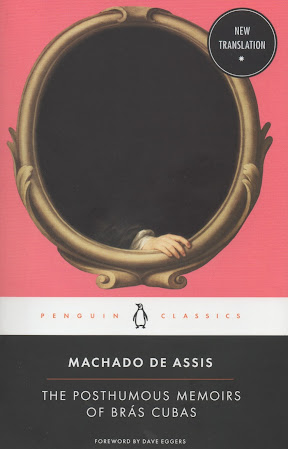First impressions review: The Posthumous Memoirs of Brás Cubas, by Machado de Assis
This short Brazilian novel, published in 1881, is exactly what it says on the tin – memoirs narrated by a dead man. Specifically, a humorously pretentious and narcissistic aristocrat who never really accomplished anything and yet still sounds weirdly pleased with himself! The quirky style feels quite modern1 . For instance, there is one “chapter” that is nothing but a few rows of ellipses (…) because the whole point is that nothing happened!
1. Apart from some references that are no longer part of every educated person’s vocabulary. Thank goodness for footnotes!
Why is it that terrible people can be so fascinating to read about? I suppose this is technically a romance, since a large portion of the book is taken up with Brás’ affair with a woman named Virgília. But the narrator is so self-involved that it doesn’t really feel like a love story – more like the characters are going through the motions of how a forbidden love story must go. That’s a common feature of Brás’ life, really. He claims that losing his lover affects him deeply…and then blithely goes out to lunch! He tries to enter politics, not from any ideological convictions or even personal ambition – he is rich and well-connected to begin with – but just because it would sound nice to be called a minister. When that fails, he starts a newspaper just to complain about the government, which folds within six months. Virgília’s husband dies, but it doesn’t seem to occur to him that he could marry her himself now…or perhaps he simply no longer cares, if he ever truly did. Indeed, he missed his chance at both a ministerial position and Virgília’s hand in the first place out of his habitual flighty apathy. The fact that Brás dedicates his memoirs to “the worm that first gnawed at the cold flesh of my cadaver” indicates how little he cares about any other person. Virgília was at his deathbed, and he is clearly gratified by that, but he has no final message for her, or for his sister. He is a slave-owner as well, and too complacent to even think about that much. Brás in part justifies his attitude with a philosophy that all that is simply is, allowing one to view the pain of others as inevitable and even sort of inspiring or aesthetically pleasing, as if it were a tragic play.
It is safe to say that Brás is not a self-insert character. Machado (as he is affectionately known), grew up poor, the mixed-race grandson of freed slaves2, but taught himself well enough after leaving public school to become not only a well-known novelist but the first president of the Brazilian Academy of Letters. There are social critiques to be found in ‘Brás Cubas’, though they require reading between the lines and keeping in mind the unreliable, selfish character of the narrator! The author and narrator may share a certain pessimistic attitude toward life, however.
2. Individually freed: Slavery wasn’t abolished in Brazil until Machado was 49 years old! His father was a house painter, his mother a washerwoman from the Azores.
Overall recommendation: You will likely understand the social commentary aspects better if you already know something about the history and culture of 19th century Brazil (again, the footnotes help!). But even without that, this is a very entertaining and readable short novel – provided you don’t mind a dose of humorous cynicism.


